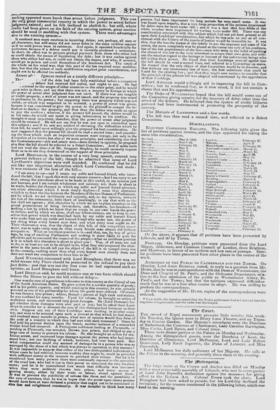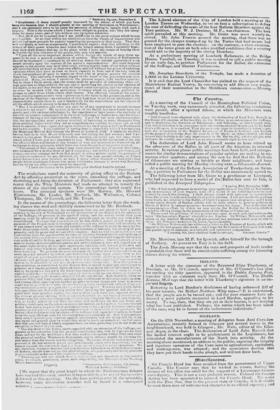Cbr flutist] lig.
The lorge room at the Crown and Anchor was filled on Monday with it must respectable assembly of Liberals, who met in conaequence of Lord John Russell's declaration against the measures for giving effect to the Reform Act, Colonel Evans took the chair, Lord Brougham had been asked to preside, but his Lordship declined the invitation ; for the reasons mentioned in the following letter, which was read to the meeting.
" Berkeley Square, December 2. Gentlemen—I deem myself greatly bonneted by the desire, of which you have bee. the bearers, that I should preside at the meeting of Reformers in Westtninster ; and I am 'Untimely sorry to be under the necessity of refusing to comply with such a retreat. This is the course which I have been obliged to pursue, whit very few excere tions for many years. awl of late without any exeeption whatever. " But, let it not be imagined that I am indifferent to the great subject which brings
yoa together. At no time within my recollection have the friends of improvemeut aud rearm had more grounds for anxiety regarding the prospects of their CUUSC. That thev %ill MI firmly as well as temperateiy. I confidently expect ; that they will shun, to the almost of their power. whatever may widen the breach among them, I earnestly hope; that they shall always. find me in my place, while I have any means of helping them to further the best interests of the people, they may rest assured.
" Upon all the more important matters ehich occupy the miuds of men, there ap- pears to be now a general coincidence of opinion. That the duration of Parliaments should be shortened, ie confessed by all who can descry the natural operation of a six years security upon the conduct of the nation's representatives. But more frequent appeals to the country may beof little avail, while a mighty body of our fellow citizens are excluded front all share in their own affairs, and left without the power of enforcing Opinions which they have at least as much capacity to form. and at the very least as much independence of spirit to assert, as those alto at present possess the elective franchiae. This exclusion I certainly regard as the worst of the grievances now com- plained of. Many, for %horn I entertain the greatest reepect, hold another opinion; but to them I freely admit, that the means must be provided of restraining those cor- rupt practices so disgraceful to the age, and oi protecting the elector in the exercise of his rights, to the end that the law may no longer Meter corruption, and the subject may no more be mocked with the permission to choose whom he Veasee, provided he pleases to select those whom others shall choose. The effectual control of the consti- tuent over the representative body—protection to the voter in the pc,sseseion and iu the exercise of the franchise—an extension of that franchise to all whose intelligence :Ind respectability enable them to use it beneficially for the state—these are the objects of all the efforts whieh remain to be made for Reform.
May I be allowed to add, what can only he of any importance to myself, because it relates to rue alone? alv opinion in fasour of the Ballot has been forced upou rne,
slowly and with extreme relactance, bv the experience of later years—the enormity of the evil universally complained of in tie cruel sufferings of honest men, and the Itoee- lessness of finding a less objectionable remedy. Upon he yet more enormous injus- tice, the incomparably more jerilous mischief. of excluding so many thoueands t'rom those political rights which they are so unquestic,nahly entitled to enjey, end so 'sell
fitted to exercise, I have again and agaio deelared my fixed opinien Loth in Parliament and to the country. I am confident of having done so repeatedly %%tele I was carrying
the Municipal Reform Efill through the House ot Lords in is35. I distinctly recollect having done so in that Muse both each' and late during the last S."SiiUts; sod I ad- dressed to the great Manchester Education meeting. six weeks i.iO. the same semi. meuts which I have just niva expressed to you. Nothing in the occurrence of the day has affected these sentiments in any mauner et' way, nor increased we lessened my at- tachment to those principles which have ever been the guide of my iriblie condect. " The events of late years, iodeeil, may have severed the ties of ancieut friendship, and weakened for a Nelson thole of party connexion ; but neither time. nor eltance• tine change, can ever estrange me from that people in e hose service. under the guidance of a judgment unfettered by any dictation, me life has been paesed—whom, as I have never flattered not ever delude.l. so have h never either deserted or betrayed—that people whose confidence I know wits never withotrawu, because it never was forfeited, and fur whom my affecti et can never be impaired.
'' I have the hoarier to be, gentlemen, sour obedient humble servant,
BROV,IHAM."
The resolutions stated the necessity of giving effect to the Reform Act by affording protection to the voter, extending the suffrage, and shortening and fixing the duration of Parliament : they also expressed regret that the Whig Ministers had made no attempt to remedy the abuses of the electoral system. The proceedings lasted nearly five hours. The principal speakers were Mr. Harvey, Mr. Howard Elphinstone, Mr. Leader, Mr. Roebuck, Mr. Warburtun, Colonel Thompson, Mr. O'Connell, and Mr. Ewart.
In the course of the proceedings, the following letter from the work- ing classes was read and skilfully commented on by Mr. Roebuck.
"Gentlemen—Perceiving by the newspapers that you are about to hoist a public meeting in the city of Westminster fur the attainment of the Ballet and the extension of the Suffrage, we presume in the spirit of unien. and the ardent desire that your meeting shall be effective of the greatest possible good, to trwible you with a few observation,. We hope that yuu w ill so act at this critical tweed. as out to give the enemies of the People room to triumph cner lee and us: which they will assuredly do If you cannot raise up the voices and energies of the millions to assist in carry ine for- ward those plans ultich are essential to the interests of industry, the security of pro. property, and the peace and eeletre of the country. Awl tee feel hound to tell eres our convictions. froin the oppertunities we have of kretwine the sentiments WO opinions of the masses, that 5 ou 55 ii never call lip their cordial cooperation aIld sermon unless eou cast aside all selliell feeliegs and strise to render them justice. tin the cuutrue. ieou seek to obtain PXCIUSiVe political towers and selfish measures, they will regard you in the same light as they do our open oppressors; awl 11111.1 %till nettled palm siert and distrust mar every beneficial measure, and euable party and fact ton to perpetuate their dornhdon. We preimme we wee) Out repeat the justice of ma la etlivel's clam. as every man not arta:dot by selfish and ceintreeted feellues must admit—that as the object of all j 1st gevernment she di be te met-talk lemetis ell the proele, and tea an excleeive end pri% ilege.t ponies, ; so, ti effect that 4:1.jefet, ..11414t ise 8) sIc M to le- established, ewl net an exebisive and corrttpt one. Tlett tile sy stem ot representation, as establietted by the Reform Bill. is itejtiet in principle and COI nye in practice, as it confers political rights ex■ausively on property instead of human beings , and III its (11,EROioil has glE,E1 the Whole representative power of the C, ii ti about
eight hetelred ti. te I electors, elle ale sehj-eted to every sieeies of bribery, bait:11.1a.
tion, and eorruptien the enemies of pehlic liberty can devise. Ante therefere, eiten we pereeive Whig and 'Very equally. opposine arty amendsnent of this alsureinable system, and consenmently epposiug Our wiward ',regress to better things and a iser masures, ought not all geed M.-11 to unite in one leterreiiie bawl, to eetablish eithetit delay wu representative fe!, item epen jest an emble prieeitees ? You may very jestle enter- tain appr ,heiteions th it vs iii may neeree from inv.-eine the ignorant and the .1h:se paled with their politic.; fields; led, on tee other hame have you :nqaired whether the evils at present existioe with is ern itch fret.ehise ere not etete.le ? Whelre else the reels am: correptiuns if is16,i, you eomplein, the like ty sane itainade tbo sr, IrMly talkwl fr0-11 remer and profbeaey on the elm Fiend, and disholwety on ths other—a tickets inelinat ion on the part ,, tin con ,f ituents to sell . heir rights, to ureter their private iistereete to their piteic liberties—arid a thy. positIon or. the part of eerrept representatives to re. .ii then...eve, of the pitch:see. We feel sa'a,fied that the widest exteusion of the nufleme will. epon ireeetigation, be fervid
to be the only eflicient core for the corrujeione %Ott complain of. But, if you particu- larly seek to protect e fele libectiee against the drunken and the dissip ded, lay down any equal and general plan by which they shell male an exception : we feel satis-
fied that you will have a hearty response from our class, providing you do not make an exception, in favour of your own. " Our objection to the liellot. unaccompanied with an extension of the ',uffrage, oti. ginates in the conviction that the pr-to-lit constituency only seek to legis'ate for their
class, and not for the multitude ; that they sett( to monopolize within their own circle
the power of sending Members to Parliament. 11101 to seltidily benefit by selecting the rich rather than the honest arid the comjwtent. We belieyt. thet the helmet course you pursued at the late election places y0.1 preeedneetly elsove ewe' impetation; lett we canted conceal the conviction that yet Pe in ote• ri a Sr* few noble exceptioue. We are, therefore, the more desirous that you, who have hitherto brVf1 in the foremost ranks of Reform, shoelni come out ou this great occesion, a rel generously and bOldiy proclaim your senitiments in fatuity of the lielustrioes
" Trusting eue will rest shrink feast tlety so jest and important at +1.1s eventful crisis, we remain, gentlemen, yours moot resiectielly, the Member, el the Wm king Men's Associatiutt.
(Signed) SY.RAPHISA C 0.7,V.ItA RA, Chairmau. WILLIAM LGY T, :.leeretary ."
[ We regret that the great length to which the Pailiamentary debates have reached this week, renders it impossible to give any of the speeches delivered at this meeting. On the tone and chat deter of the assembly, however, some illustrative remarks will be found in a subsequent
The Liberal electors of the City of London held a meeting at the London Tavern on Wednesday, to set on foot a subscription to defray the cost of defending the seats of the four Reform Members against the Tory petition. Mr. W. J. Denison. M. P., was chairman. The best spirit prevailed at this meeting. Mr. Grote was most warmly re. ceived. Mr. John Travers assured the meeting, that there was no ground for the charges trumped up by the Tories that foul means had been employed to gain the election : on the contrary, a close examina- tion of the votes given on both sides justified confidence that a scrutiny would add to the majority of the sitting Members.
At a preliminary meeting of Lambeth Reformers, at the Bridge House, Vauxhall, on Tuesday, it was resolved to cull a public meeting for an early day, to petition Parliament for the Ballot, the extension of the Suffrage, and Shorter Parliaments.



























 Previous page
Previous page